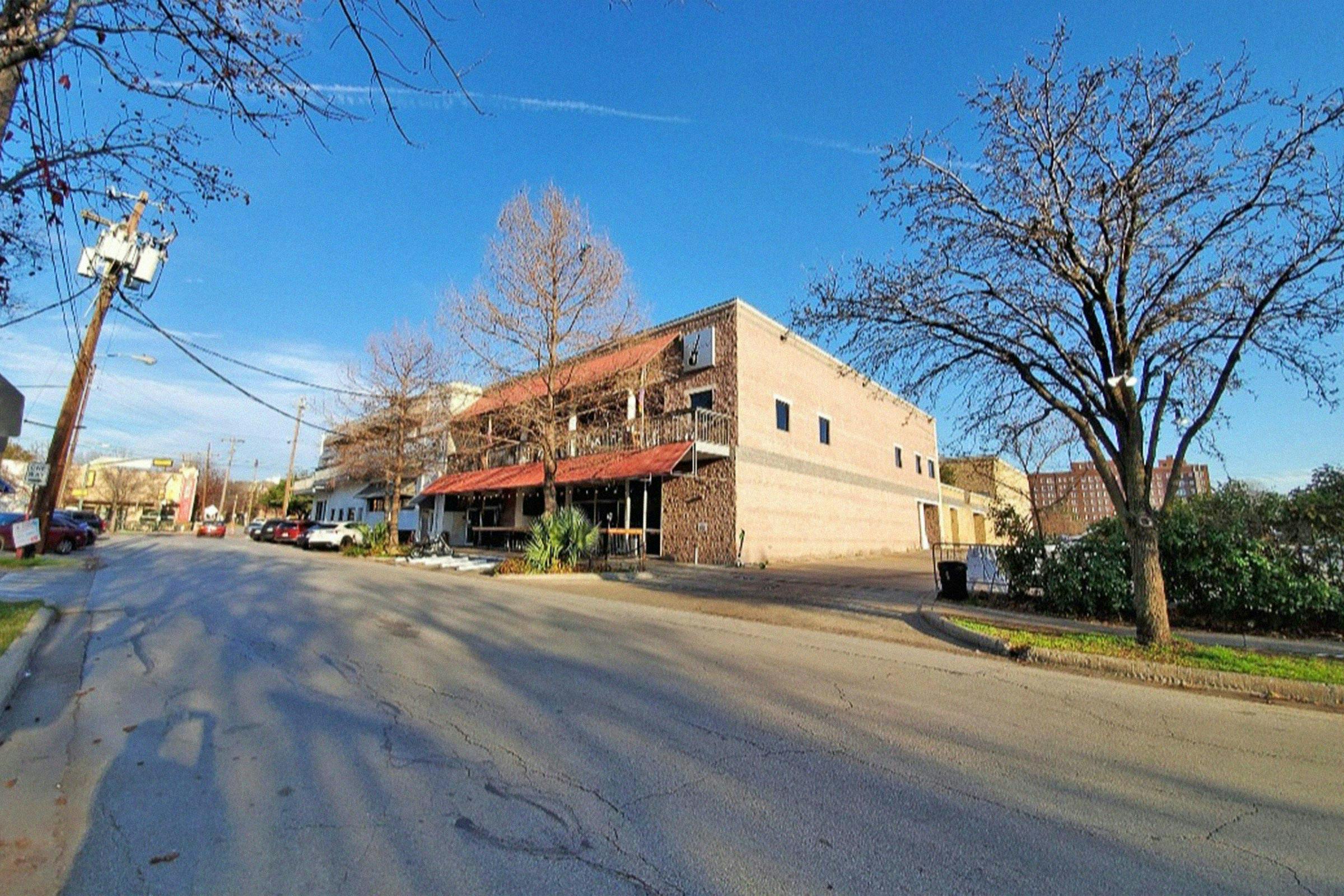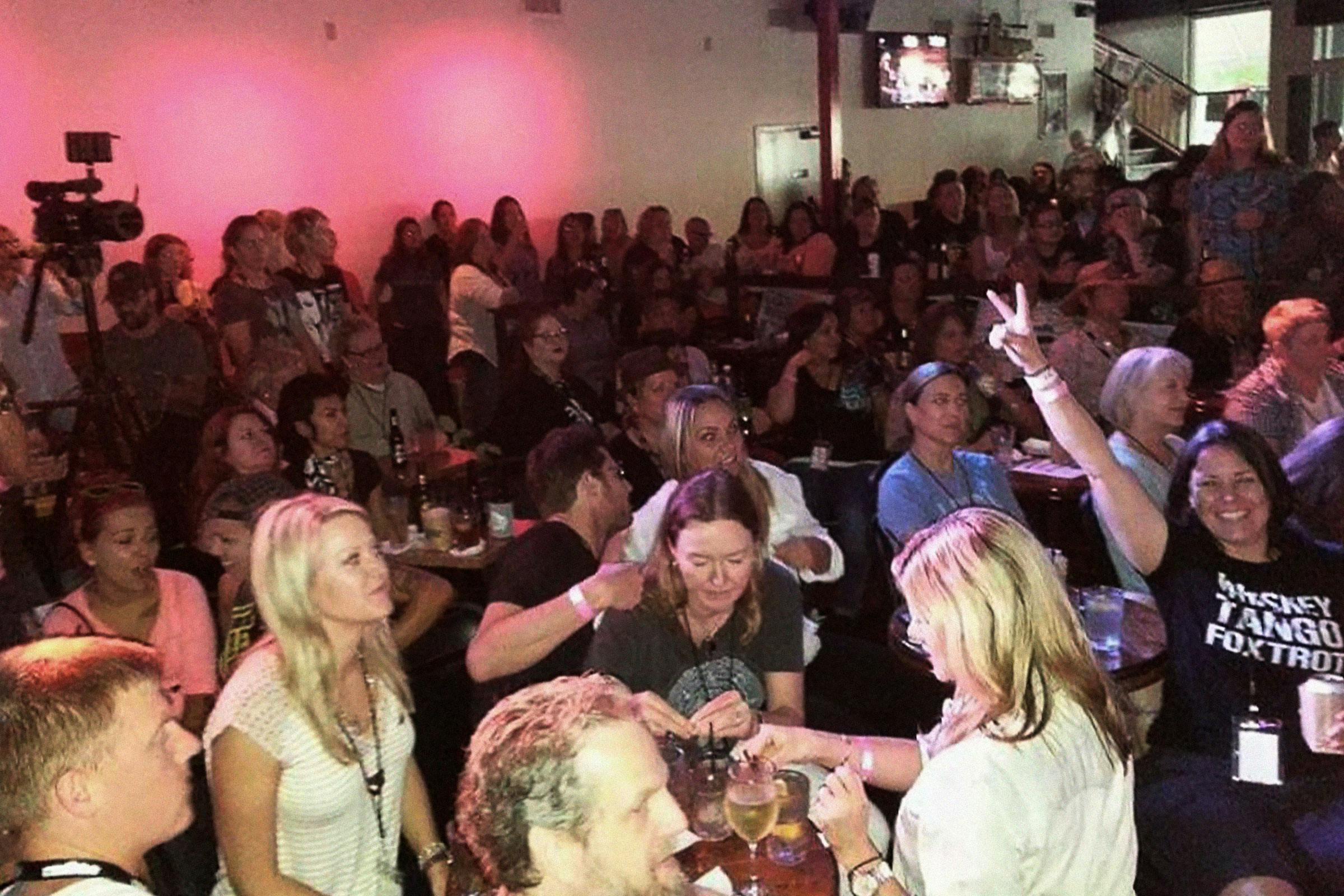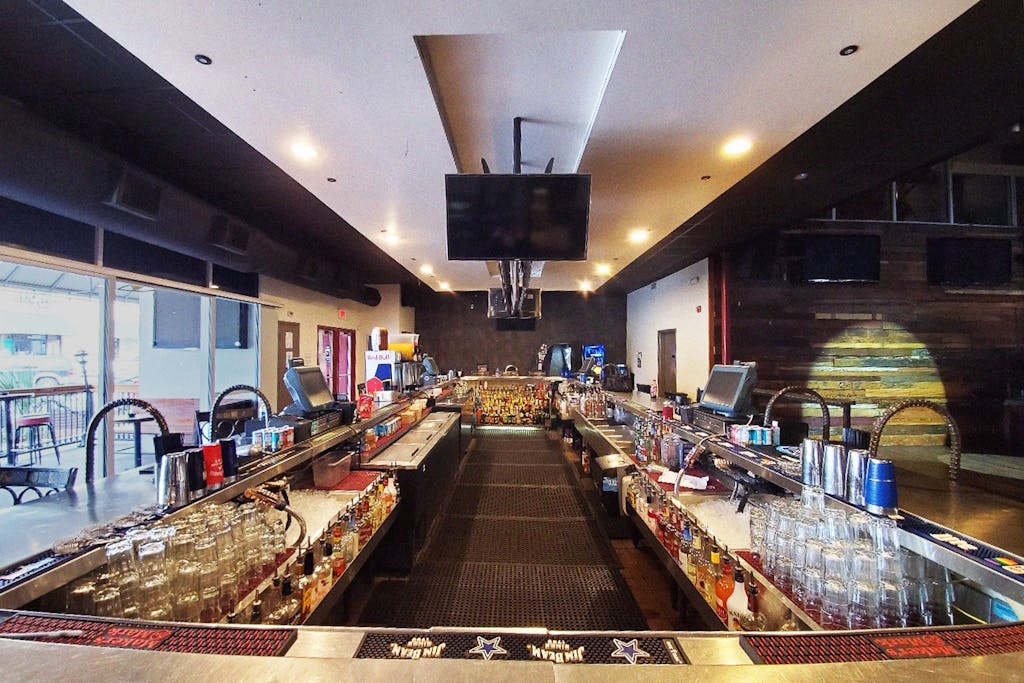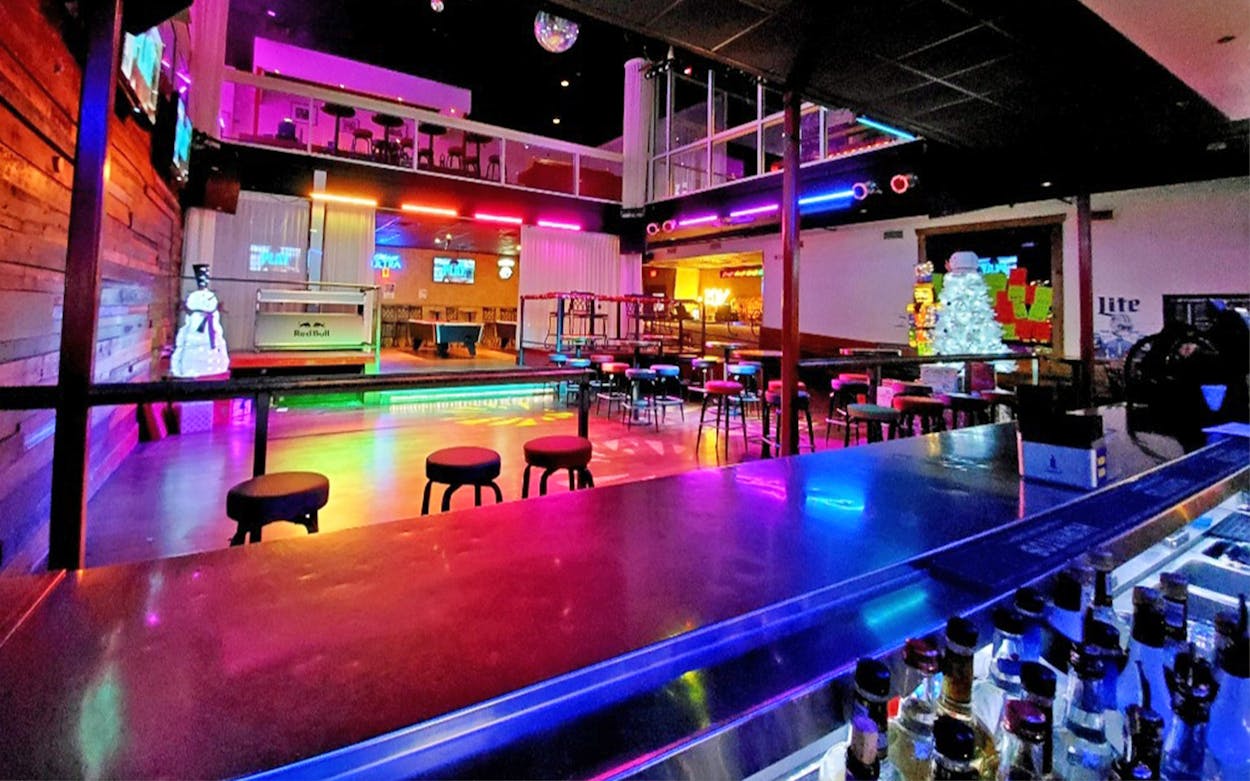On a Thursday night in December, well before the coronavirus pandemic had reached the United States, two to three hundred women were gathered at Sue Ellen’s, a remnant of Dallas’s once-bustling lesbian nightlife. As one regular put it, “Chick Happy Hour” is a roving monthly congregation of the city’s lesbian socialites who gather the first week of every month, each time at a different bar. On this particular night, patrons passed from room to room in the two-story bar, flirting with one another as they made their way to the downstairs counter, sometimes ordering two drinks at a time. The place was so packed, someone could practically sober up before even making it back to their seat.
Dee Pennington, the creator of “Chick Happy Hour,” sat on a grandiose wooden armchair (which she calls her throne) on the Sue Ellen’s stage. Here, you can often find duos singing Indigo Girls covers, drag and burlesque performances, and karaoke. Pennington was celebrating her sixty-first birthday at the happy hour that night. After the bar collectively sang Pennington a happy birthday, she pulled a Barbie from her cake and licked the icing from the doll’s legs. Pennington says she felt happy—and yes, gay—that night surrounded by so many loved ones, including the bar’s owner, Kathy Jack. A few hours before, Jack had dusted off Pennington’s throne and presented her with the cake and the accompanying toy inside.
A matriarch of the Metroplex’s queer nightlife, Jack is a 62-year-old with a closely cropped silver fade. More than thirty years ago, she broke through in the Dallas queer nightlife scene as one of the city’s first women to manage a bar. (“There might’ve been one before I came into the community, but not that I know of,” she says.) Jack’s presence and ability to take charge of a room are rivaled only by her capacity for making patrons feel welcome. “She has the kindest brown eyes,” says Kathy Corbin, who’s been singing at the bar for two decades and, before that, dated Jack on and off. “They’ll fill with water almost every time she makes a speech to the staff.”
Except for a brief stint away from the bar in the mid-aughts, Jack has presided over Sue Ellen’s since it first opened in 1989. The venue sits among several queer bars lining what locals call the “the Block” along Cedar Springs Road in Oak Lawn, the city’s “gayborhood” that’s home to many LGBTQ bars. Sue Ellen’s remains indefinitely closed during the pandemic, though it briefly reopened last month. But Jack believes the bar will live on forever, and so do her regulars—after all, the bar has survived an epidemic before. Other lesbian bars have not been so lucky. Even before the pandemic closed countless small businesses around the nation, a 2018 report counted fewer than ten lesbian bars left in the country. Sue Ellen’s is Texas’s oldest, and is thought to be one of two left in the state (the other is Pearl Bar, in Houston).
In its 31 years of operation, Sue Ellen’s has lived through the AIDS epidemic, a housing crisis, and a recession, in addition to weathering the recent COVID-19 pandemic. Life in Dallas, and for LGBTQ people across the country, has transformed through these decades, from the end of sodomy laws (in which Dallas lesbian Mica England played an early role) to the legalization of gay marriage; from a citywide equal rights ordinance for transgender people in 2015 to this June’s Supreme Court ruling mandating nondiscrimination protections for all LGBTQ people. Through all of this, patrons have come back to Sue Ellen’s to drink beers, go on first dates, and meet up with friends. “Sue Ellen’s has always been a place where everyone’s welcome,” Corbin says. “And you suddenly become part of this family, and you keep wanting to go back.”
Jack attributes the bar’s longevity to her staff—particularly their staunch commitment to welcoming all walks of life in a town that used to segregate its queer nightlife by gender. Her regulars, though, say that Sue Ellen’s has lasted so long because of Jack herself. “She’s not just the manager of a lesbian bar,” Pennington says. “She’s the manager of the lesbian community.”

In 1978, a friend invited Jack to the High Country, a country and western lesbian bar that catered to a mixed crowd and was located about two miles down the road from where Sue Ellen’s would eventually sit. At the time, three other lesbian clubs existed across the city, but not having come out yet herself, Jack hadn’t visited any of them. She quickly felt at home at the High Country, though. Born in Shreveport, Louisiana, Jack grew up riding and training horses. Though she’d never two-stepped in her life until she started working in Dallas, she soon found herself teaching dance lessons at the bar, then waiting tables, and eventually working her way through the ranks of the city’s queer bar scene. She was in.
And then she was out. The next year, in 1979, Jack told her mother she was gay. Her mother then told Jack not to come home. Six weeks later, Jack walked to her car in her apartment’s parking lot and found a note: “I can’t do this. Call me.” She and her mother made up as best they could. “She didn’t understand it and probably didn’t truly understand it the day she died.” Jack says. “But she accepted me. It’s a much better story than most that I’ve heard.”
When the lesbian bar that Jack was managing, the Unicorn, folded in 1986, she moved to the Block. Trying to make rent, Jack persuaded the manager at the nearby bar Old Plantation to hire her as a doorwoman, despite her years of experience above that pay grade. Two months later, she became the Old Plantation’s manager. It was a rough start, Jack remembers, and she struggled to get along with the mostly male staff at first. “They didn’t like a female being their manager,” she says. But during her tenure, women started to come in after hours—from 2 to 4 a.m.—looking for a space to spend time, drink, and socialize without being harassed by men.
In 1988, she lobbied her bosses at Caven Enterprises—a group that still owns nearly all of the city’s gay bars—for a women’s bar. They said no. But after nearly a year, they finally relented because, as Jack puts it, “I just kept on and on. I really think they just got sick of hearing me.” All the while, Jack remembers that the men surrounding her were in disbelief that a women’s bar could survive at all. She recalls that both her bosses and her coworkers joked that they were going to build a men’s bar in its place or, worse, that they already had made plans for the space, awaiting its inevitable demise. “I don’t think they really thought it was going to last,” she says.
The name for the new bar, Sue Ellen’s, wasn’t Jack’s choice; her bosses at Caven made the call, with the name intended to honor the divorced couple in Dallas, CBS’s primetime soap opera. (Interestingly, in the 2012 reprise of the series, Sue Ellen Ewing both outlives her ex-husband and becomes one of the city’s most powerful women, though Caven couldn’t have known that when it christened the watering hole.)
At 7 p.m. on January 19, 1989, Sue Ellen’s opened its doors. The bar’s first home was a few blocks down the street from its current location; it’s now at the intersection of Throckmorton and Cedar Springs. Jack’s bosses had given her a tiny shotgun bar in a strip mall, and Sue Ellen’s shared a wall with a flower shop. Caven did let Jack design its interior; she decked out the space with turquoise and the iconic eighties glass bricks, for a vibe that recalled Miami Vice. People “had never seen anything like that,” Jack says. On the first night, as Jack bussed tables and delivered drinks, she remembers that the place was so packed that it took her twenty minutes to get across the crowd. Five months later, she was already expanding Sue Ellen’s, tearing down a wall and absorbing the floral shop next door to build out a game room and add expanded seating and more room for dancing.
The bar has expanded another four times since then, outlasting many of its neighbors. In 1990, High Country went under; the year after, it was followed by Desert Moon, a western bar known for playing strictly country music. The two remaining lesbian bars in Dallas—Jugs and Buddies—held out until the turn of the twenty-first century, but both closed their doors shortly after. These closings reflect a trend across the country: lesbian bars are quickly disappearing, and at a faster clip than men’s gay bars.
Part of this has to do with online dating, which has apparently rendered bars somewhat archaic (although plenty of dates still happen at bars). When the last lesbian bar in San Francisco closed, one writer also cited gentrification, which changed the demographics of the neighborhood to include many more straight, white men than had lived there before. The owners of a Louisville, Kentucky, lesbian bar held a benefit to stay afloat last year; as LGBTQ researcher Kaila Story told the Courier Journal, that’s not uncommon. Lesbian bars are so specific and so community-oriented that they rely on a “word-of-mouth reputation” and a loyal patronage.
For Karen Wisely, a Dallas LGBTQ historian who’s writing a book about Sue Ellen’s, the bar’s endurance has as much to do with what it offers—a women-focused, mixed-gender joint—as with what the Block’s other queer bars don’t. Throckmorton Mining Company’s lowlight lounge, for instance, isn’t what she, a self-described 52-year-old “socially awkward academic,” is looking for in a night out. (“It’s really dark, and, you know, there’s stuff going on that they don’t want you to see.”) And Wisely can’t take more than five minutes of S4’s house music before she’s ready to sit down somewhere low-key and chat with friends. “It covers a different kind of a feeling, a different kind of atmosphere,” she says of Sue Ellen’s. “It’s a thing that attracts a crowd that is incredibly loyal, whether it’s men or women or a mixture. The people who go there, that’s their preferred bar.”

Sue Ellen’s has also long been a place where the community has come together in times of crisis. Dallas was one of the hardest-hit cities in the U.S. during the AIDS epidemic, to the point where, in 1988, the Dallas Gay Alliance sued Parkland Memorial Hospital to pressure it to take the crisis seriously. (The suit was dismissed, but a judge did order the hospital to eliminate waiting lists for treatment.) At the time, the doctors at Parkland who treated AIDS patients prescribed an inhalant called pentamidine to prevent pneumonia, but wouldn’t give it out as a mist, which worked better. What’s more, Dallas didn’t get experimental treatment or clinical trials of antiretrovirals until 1990—three years after AZT’s approval and subsequent rollout in cities including New York, San Francisco, and Miami.
This meant that the Dallas community had to step in to help people survive. Some women—many of whom would later run the Dallas LGBT Resource Center—made house calls and administered the mist themselves. “Those same nurses were the ones that would go in and take off the gloves and hold hands with the patients when they were dying because they weren’t getting any skin contact, because people were so afraid of catching it,” Wisely says. The boyfriend of Jack’s roommate was one of the first men to be diagnosed during the AIDS epidemic in Dallas, and as more of her friends started to fall ill, Jack took several people who were sick into her home.
Some days, Jack says, she went to four funerals. When she felt herself starting to numb from the pain of losing her friends, she called a host of drag queens to Sue Ellen’s—and one night, Jack herself even dressed up—to host fundraisers. Throughout the epidemic, the bar consistently raised money for the community’s sick and dying loved ones, and raised glasses to their memories. “That was a really busy time for us, because people just needed an outlet,” Jack says. “Basically, we’re doing the same thing now.”
When Texas started to reopen bars in a limited capacity, Sue Ellen’s went from a place to rub elbows under flashing lights and a disco ball to a space where interaction requires six feet of separation. Whenever it returns, it’ll likely look the same as then: the stage has been removed, the billiards have disappeared, and the dance floor has been replaced by tables. When the bar temporarily reopened in mid-June, dozens of women followed the rainbow crosswalk down Throckmorton Street—not unlike a yellow brick road for lesbians—to Sue Ellen’s front door.

Sunday, Jack’s favorite weekly shift, is typically filled with patrons enjoying live music, drink specials, and cookouts at the bar’s outside space. “It pretty much is gay church,” she says. On a recent Sunday in mid-June, Jack stood at the bar’s front door, brandishing a bottle of sanitizer in one hand and a thermometer in the other. She checked guests’ temperatures and smiled behind her mask to welcome each regular as they filed in. Patrons wore face coverings until they reached a table in one of the bar’s seating zones—six tables extending the bar top outward, allowing the recommended distance between bartenders and the guests they were eager to serve. People jostled toward the counter, vying for the limited space in the bar, which opened at a quarter capacity, allowing up to 125 people.
The reopening was short-lived, though: Texas has once again closed bars because of the growth in COVID-19 cases, and Sue Ellen’s has temporarily shut down once again. Angel Smith, a regular and former employee, visited the bar nearly every day during the brief reopening. “The bar closing was like losing a part of who we are,” says Smith, who is quick to joke—or maybe not—that she wants to have her funeral there.
Jack is also thinking about endings. After 42 years working in the service industry, she says she’ll retire within the next three years; she has somewhere beachy in mind. While Jack says that reopening Sue Ellen’s is one of her last projects—no matter how many times it takes—she’s not worried about it. “It’ll keep going,” Jack says. “That bar would last whether I was there or not.”
- More About:
- Business






